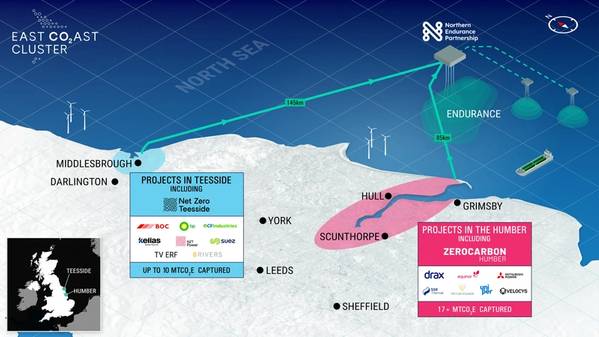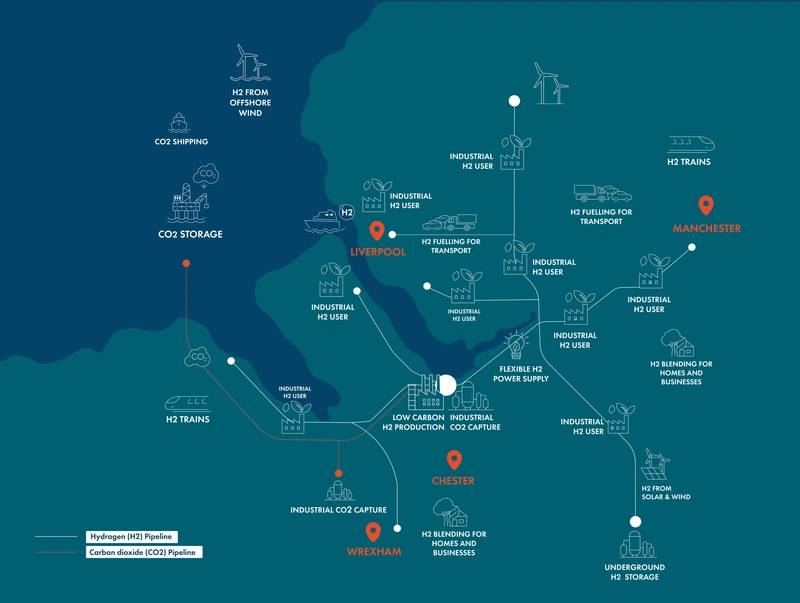
The UK Government has selected two industrial clusters as Track-1 clusters for the development of carbon capture utilization and storage projects, putting them on course for launch by the mid-2020s with financial support from the government.
This follows a process launched by the Government earlier this year to determine the sequence in which it would support the decarbonization of regional industry clusters across the UK.
Thie process has placed the clusters in the following two ‘tracks’: Track 1: begin decarbonizing industry from 2025; and Track 2: begin decarbonizing industry from around 2030.
The two CCUS clusters now labeled Track-1 are Hynet Cluster in North West England and the East Coast Cluster in Teesside and the Humber. The Scottish Cluster, which includes the proposed Acorn CCS project, has been announced as a “reserve cluster” for ‘Track 1’.
"Following the completion of Phase 1 of the Cluster Sequencing process, the Hynet and East Coast Clusters have been confirmed as track 1 clusters for the mid-2020s and will be taken forward into Track-1 negotiations. If the clusters represent value for money for the consumer and the taxpayer then subject to final decisions of Ministers, they will receive support under the government’s CCUS Programme," the government said.
"We are also announcing the Scottish Cluster as a reserve cluster if a back-up is needed; we will continue to engage with this cluster as well as the track 1 clusters, throughout the next stage of the process. This puts these places - Teesside, the Humber, Merseyside, North Wales and the North East of Scotland - among the potential early SuperPlaces which will be transformed over the next decade," the Government said.
Explaining what this means for the Scottish Cluster, Greg Hands, Minister of State for Energy, Clean Growth and Climate Change said:"A reserve cluster is one which met the eligibility criteria and performed to a good standard against the evaluation criteria. As such, we will continue to engage with the Scottish Cluster throughout Phase-2 of the sequencing process, to ensure it can continue its development and planning. This means that if government chooses to discontinue engagement with a cluster in Track-1, we can engage with this reserve cluster instead."
The East Coast Cluster is enabled by the Northern Endurance Partnership – a collaboration between BP, Eni, Equinor, National Grid, Shell, and Total, with BP leading as operator.
This cluster, which unites Net Zero Teesside and Zero Carbon Humber, has the potential to transport and store nearly 50% of all UK industrial cluster CO2 emissions - up to 27 million tonnes of CO2 emissions a year by 2030.
The HyNet partnership, of which the Italian oil firm Eni is a part, said the project would proceed with decarbonizing the North West and North Wales from 2025, reducing annual CO2 emissions by 10m tonnes by 2030. Credit: Hynet
Credit: Hynet
David Parkin, HyNet Project Director said: "We are delighted that HyNet has been selected to progress within Track 1 of the industrial decarbonization Cluster Sequencing process. HyNet is led by the demand from organizations and stakeholders across the North West of England and North Wales, who all want to reduce carbon emissions to Net-Zero. From as soon as 2025, the project will enable our manufacturing sector across the region to decarbonize, as well as providing the opportunity to transition the way we travel and how we heat our homes."
“HyNet brings huge economic benefits, safeguarding existing jobs across the region and creating around 6,000 new employment opportunities to support the leveling up of the UK.
“We are looking forward to working closely with Government and the other clusters to deliver and grow the infrastructure as rapidly as possible, both in breadth and depth, over the coming years.”
Scottish Cluster Disappointed
Commenting on the decision by the Government to have the Scottish Cluster as a reserve Nick Cooper, CEO of Storegga, on behalf of the Scottish Cluster said: “Whilst we are disappointed of the outcome of the sequencing bid, we remain convinced of the potential and significant advantages of the Scottish Cluster and are committed to the development of CCS to support decarbonization of UK industry and power.
"We have been very clear that all of the current clusters need to be operating to meet UK net-zero targets and will be seeking support to progress as soon as possible. The Scottish Cluster has been selected as a reserve project and we will continue engaging with Government to progress its development and planning. The Acorn project will play a significant role in achieving UK Net Zero and will be developed.”
The Scottish Cluster includes the Acorn CCS project, which, the partners have said, would in the first phase see around 300,000 t/yr of existing CO2 emissions from the St Fergus gas terminal captured, dried, compressed, and sent through the Goldeneye pipeline to be injected into the Acorn CO2 Storage Site – a very large volume of sandstone rock, found over 2.5km under the seabed, approximately 100km offshore from St Fergus.
OGUK - UK needs all five Carbon Capture ‘cluster’ projects and more to hit net zero
Responding to the UK Government’s announcement on the selected carbon capture and storage ‘cluster’ projects to be taken forward for Track 1 negotiations for deployment in the mid-2020s, OGUK has stressed that the UK will need all of the proposed cluster projects – and more – if it is to achieve net-zero carbon emissions by 2050.
"There are several other carbon capture cluster projects currently in development and scheduled to be put forward for Track 2 of the Government’s plan, including Acorn (North East Scotland), V Net Zero (also based in Humberside), the Delphynus cluster in South Humber, as well as one based in the Southampton area," OGUK said.
"In total, they could help the UK capture up to 100 million tonnes of carbon per year to decarbonize sectors, including heavy freight and marine transport, as well as steel, chemical, and cement manufacturing. The Climate Change Committee, has said technologies such as carbon capture and storage and hydrogen are critical in helping the UK get to net-zero," OGUK said.
OGUK Sustainability Director Mike Tholen said: "This is a landmark moment for the UK in showing the world how they can achieve net zero emissions and the selection of Hynet and the East Coast Cluster is positive progress. However, we are going to need all of these carbon capture and hydrogen projects and more if the country is to become carbon neutral by 2050
"Of all the carbon capture clusters in development, every single one of them involves an oil and gas company. With 50 years of expertise producing energy, the UK’s changing oil and gas industry is using its skills to help the country hit net zero. We look forward to seeing both Track 1 and Track 2 clusters make progress urgently, turbocharging progress towards our climate goals while providing jobs and opportunities to energy communities across the UK.”



